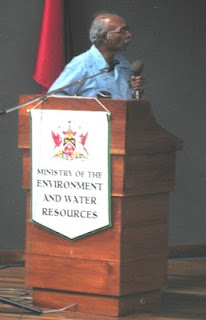 | |||
Permanent Secretary,
Vidiah Ramkhelawan giving welcoming remarks on behalf of the Ministry of the
Environment and Water Resources
|
As
a signatory to the Stockholm Convention on Persistent Organic Pollutants (POPs), Trinidad and Tobago is required to prepare a
National Implementation Plan (NIP) which will guide the implementation of
obligations of the Convention in the country. This project commenced in
September 2011 and will continue for a period of two years.
There are two
major components of this project. The first component is the Socio-Economic Assessment (SEA) for management of POPs. The SEA was a complete evaluation of the potential social and economic impacts of POPs in order to provide a basis for the minimisation of the negative effects on all sectors and population groups as well as provide a baseline to measure the effectiveness of planned interventions that form part of the NIP.
The second component of the NIP project is the development of a National Profile on Chemical and Waste Management in Trinidad and Tobago. This involved a comprehensive assessment of the national capacity and infrastructure for chemical and waste management, along with gaining an understanding of the nature and extent of chemicals availability and use in the country.
The second component of the NIP project is the development of a National Profile on Chemical and Waste Management in Trinidad and Tobago. This involved a comprehensive assessment of the national capacity and infrastructure for chemical and waste management, along with gaining an understanding of the nature and extent of chemicals availability and use in the country.
 |
Dr. George Sammy,
consultant for the National Profile, presenting the results of his findings
|
The findings of these components formed the basis of the Second National Stakeholder Workshop. The workshop was also
aimed at raising awareness amongst relevant stakeholders, assessing
present national capacities and ensuring that there are unified cooperative
efforts on a National scale as the project moves to completion.
 |
|
A working group session
on one of the discussion topics of the workshop
|
The Ministry wishes to thank all
stakeholders who attended the workshop and looks forward to their continued
support as the Project progresses.
Would have been informative to give some highlights of the discussions/outcome of the consultation
ReplyDeleteThe discussion focused on four areas:
ReplyDelete1. The benefits/demerits of the two proposed management systems for industrial chemicals in Trinidad and Tobago
2. A public information campaign on chemical safety
3. Mechanisms to improve the information flow between regulatory agencies and industries
4. The Health, Safety and Environment Department/Officers in industries
The article has been updated with further information on the nature of the workshop including a section where you can access the presentations and discussion topics.